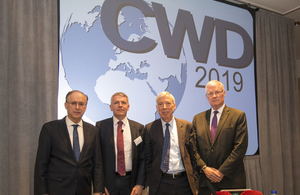UK reaffirms commitment to chemical weapon prohibition at international conference in London
The 22nd annual Chemical Weapon Demilitarisation Conference is being hosted by the Ministry of Defence and the Defence Science and Technology Laboratory in London over the next two days (23-24 May).

Left to right: His Excellency Ambassador Fernando Arias, Director General, OPCW; Gary Aitkenhead, Chief Executive, Dstl; Rt Hon Earl Howe, Minister of State for Defence; Hon Alan Shaffer, Deputy Under Secretary of Defense, US DOD. Crown copyright.
The Conference has been held every year since 1997, when the Chemical Weapons Convention entered into force, banning chemical weapons and requiring states to destroy any existing stockpiles. The Convention has succeeded in achieving the destruction of over 96% of the world’s declared chemical weapon stocks – amounting to some 70,000 tonnes of chemical weapon agent and millions of bombs, rocket warheads and artillery shells. The Conference provides an opportunity for experts from all over the world to discuss their progress and co-operation in eliminating chemical weapons, and the technical challenges that remain, and to share experiences and lessons.
Although there has been considerable progress with the destruction of former stockpiles, the Chemical Weapons Convention continues to face serious challenges. These were illustrated all too recently by the chemical weapon attack in Salisbury in March 2018, and the chemical weapon attack by the Asad regime in Douma in April 2018. Following these shocking events, the UK took the international lead in securing agreement that the Hague-based Organisation for the Prohibition of Chemical Weapons, the international body which implements the Chemical Weapons Convention, should take steps to identify those responsible for the use of chemical weapons in Syria, so that the international community could hold them to account.
Defence Minister Lord Howe commended the vital work of scientific and technical experts to make the world safe from chemical weapons, while acknowledging the shocking events of the past year, including the chemical weapon attacks in Salisbury and Syria.
Defence Minister Lord Howe said:
This Conference plays a unique role in bringing together international experts so that they can work together to solve problems relating to the destruction of chemical weapons. Their scientific and technical expertise is fundamental to meeting our objective of a world free of chemical weapons.
The use of chemical weapons in Salisbury, here in the UK, and in Syria shows that there is still much to do before we reach our goal. In an increasingly dangerous world, the international community cannot allow the use of chemical weapons to become accepted as “normal” and it is important that states take action when required. The UK is determined to uphold the international norm against the use of chemical weapons. We remain firm in our resolve to respond appropriately to any use of chemical weapons by the Assad regime.
Over the past year the UK has successfully worked with our international partners across the world to strengthen the Chemical Weapons Convention: we have agreed measures to identify those responsible for using chemical weapons in Syria and elsewhere so that we can hold them to account. This is a complex but crucial task. I look forward to progress over the coming months by the independent experts of the Organisation for the Prohibition of Chemical Weapons.
Lord Howe welcomed to the Conference Ambassador Fernando Arias, Director General of the Organisation for the Prohibition of Chemical Weapons, who bears unique responsibilities, on behalf of the international community, for achieving the objectives of the Chemical Weapons Convention.
Director-General of the Organisation for the Prohibition of Chemical Weapons Ambassador Fernando Arias said:
The goal of the Chemical Weapons Convention is, ”for the sake of all mankind, to exclude completely the possibility of the use of chemical weapons”. Completing the destruction of all chemical weapons is, therefore, a key priority for the Organisation for the Prohibition of Chemical Weapons. We rely on the political commitment of governments and the scientific and technical skills of government experts and industry.
I am delighted to address this unique conference and meet some of the experts who are helping to make the world safer for all of us. The continuing use of chemical weapons in recent years underlines the importance of our shared mission and the challenges that we face in completing it, having always in mind that the goal is the complete destruction and the guarantee against any kind of re-emergence of chemical weapons all over the world and forever.